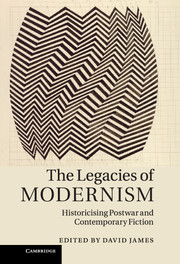Book contents
- Frontmatter
- Contents
- Notes on contributors
- Acknowledgements
- Introduction: mapping modernist continuities
- Part I Early legacies: inheriting modernism at mid century and beyond
- Part II Modernist aesthetics in transition: character, perception, innovation
- Part III Reassessing the ethics of modernist fiction
- Chapter 8 A complex legacy: modernity's uneasy discourse of ethics and responsibility
- Chapter 9 ‘A renewed sense of difficulty’: E. M. Forster, Iris Murdoch and Zadie Smith on ethics and form
- Chapter 10 ‘Myths of desire’: D. H. Lawrence, language and ethics in A. S. Byatt's fiction
- Part IV Modernism's global afterlives
- Epilogue Finding the dreadfully real
- Index
- References
Chapter 8 - A complex legacy: modernity's uneasy discourse of ethics and responsibility
from Part III - Reassessing the ethics of modernist fiction
Published online by Cambridge University Press: 05 November 2011
- Frontmatter
- Contents
- Notes on contributors
- Acknowledgements
- Introduction: mapping modernist continuities
- Part I Early legacies: inheriting modernism at mid century and beyond
- Part II Modernist aesthetics in transition: character, perception, innovation
- Part III Reassessing the ethics of modernist fiction
- Chapter 8 A complex legacy: modernity's uneasy discourse of ethics and responsibility
- Chapter 9 ‘A renewed sense of difficulty’: E. M. Forster, Iris Murdoch and Zadie Smith on ethics and form
- Chapter 10 ‘Myths of desire’: D. H. Lawrence, language and ethics in A. S. Byatt's fiction
- Part IV Modernism's global afterlives
- Epilogue Finding the dreadfully real
- Index
- References
Summary
As we all know, the word ‘ethics’ has proliferated in recent critical studies, sparking a high degree of controversy. Some applaud it, some condemn it, while others argue that, like ideology, one cannot ‘step outside’ ethics. One might question whether this advent of ethical interest in critical studies is new. In fact, it may be regarded as a flight from newness. The issue of ethics was neglected for much of the 1960s, 1970s and 1980s, partly because it was felt that ethics had been surpassed and discredited. Those on the Left considered ethics to be a liberal humanist apology for a bourgeois subject, while poststructuralists tended to suspect most ethical discourses of being contaminated with metaphysics. The American literary critic Geoffrey Galt Harpham has suggested that this new emphasis on ethics has indeed occurred as a direct reaction to some poststructuralist or postmodernist tendencies. In particular, he has singled out the – now notorious – exposure of Paul de Man's collaborationist wartime writings, which led to an opportunity for those opposing theory to dismiss theory as a kind of sophisticated rhetoric that glossed over questions of right or wrong. Yet paradoxically the critical practices of de Man, Michel Foucault and Jacques Derrida have been enlisted repeatedly over the past few decades in projects that are overwhelmingly motivated by ethical concerns – the attempts to expose the oppression of marginalisation, through culture, race, class and sexuality. These identity-centred projects are largely about the dismantling of ethical systems that present themselves as speaking for everybody; yet in countering these totalising positions and discourses of oppression, redirecting errors and omissions in arguments and uncovering blindspots and prejudices, one is inevitably impelled by ethical investments. Furthermore, many of Derrida's later works are explicitly motivated by ethical concerns, examples being The Gift of Death (1995), Politics of Friendship (1997), Adieu to Emmanuel Levinas (1999) and The Work of Mourning (2001). So it would seem that the time has come to relinquish such crude decisions between old-fashioned critical practices that engage with truth and goodness and those that have seen through such issues and abandoned ethics. One is no longer dealing with ethical and non-ethical criticism but with different ethical approaches – at the most basic, a distinction between the universalist and the differentist, or ‘other’-oriented, approaches.
- Type
- Chapter
- Information
- The Legacies of ModernismHistoricising Postwar and Contemporary Fiction, pp. 153 - 169Publisher: Cambridge University PressPrint publication year: 2011
References
- 1
- Cited by



